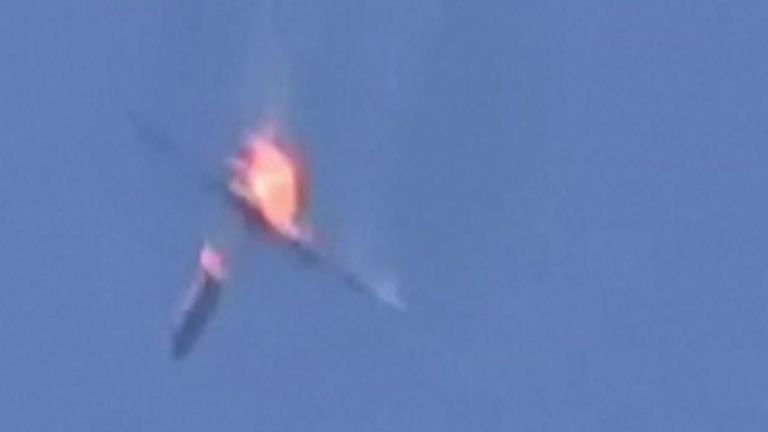Turkey accuses EU of 'betrayal, hypocrisy and selfishness' over Syrian migrants
The Turkish ambassador to the UK tells Sky News his country has "fulfilled its commitment" over the migrant crisis.
Wednesday 4 March 2020 07:22, UK
Turkey has accused the European Union of "betrayal, hypocrisy and selfishness" for failing to uphold an agreement to stem the flow of Syrian refugees and migrants into Europe.
The Turkish ambassador to the UK also said Ankara has requested military support from Britain and its other NATO allies to bolster a Turkish operation against the Russia-backed Syrian regime of President Bashar al Assad in neighbouring Syria.
The comments came as Dominic Raab, Britain's foreign secretary, adjusted an overseas tour to fit in a visit to the Turkish capital for talks on the Syria crisis with his Turkish counterpart.
Umit Yalcin, the ambassador in London, welcomed the show of support, which came after more than 30 Turkish soldiers in Syria were killed in an attack by regime forces last Thursday.
"This is very meaningful and a very important approach, a show of solidarity and friendship," he told Sky News in an interview at the Turkish embassy.
The senior diplomat had much cooler language for the EU over the bloc's handling of millions of men, women and children displaced by the Syrian conflict.
Ankara has accused Brussels of failing to meet the terms of a migration deal struck in March 2016 that saw Turkey agree to stop migrants and refugees crossing into Europe in return for €6bn (£4.7bn) and enhanced EU-Turkey ties, including visa-free travel for Turkish citizens and an upgraded customs union.
Mr Yalcin said: "We did our fulfilment of our commitment and they did not do anything.
"And because of that - enough is enough. We are overloaded. We cannot control millions and millions of people.
"We only ask for fair and equal responsibility sharing and burden sharing.
"We only want to see the fulfilment of that deal, not more."
Asked whether he thought Turkey had been betrayed by the EU, the ambassador said: "It is a betrayal, hypocrisy, selfishness and it is not sincere, it is not fair… If they can only fulfil their commitments in that agreement I think that would be wonderful."
Mr Yalcin said Turkey was calling on its NATO allies - the majority of them also members of the EU - to provide diplomatic, political, military and humanitarian support to Turkey in its fight to push back a regime advance from capturing Idlib province on its border.
The alliance's 29 ambassadors held a North Atlantic Council session on Friday, called by Turkey under Article 4 of NATO's founding principles - this refers to when an ally has concerns about its security.
This was a day after it lost 36 soldiers in Syria.
The ambassador said the meeting was useful, but he signalled that Turkey is looking for action not just words.
"The NATO support is important to strengthen our border and our air defences," he said.
"We also need deterrence against Syrian regime atrocities. And we should again keep engagement with Russia intact to keep that area calm and peaceful."
He indicated that Turkey was looking more for support provided by military aircraft and ground air defence systems than actual troops on the ground.
The Turkish military is already deployed in force in Idlib, trying to reinstate an agreed zone of "de-escalation" that had previously been supported by Moscow.
"NATO support should be visible and concrete," the ambassador said.
"We already started our own operation and we need that support behind us."
Turkish President Recep Tayyip Erdogan is due to meet with President Vladimir Putin in Moscow on Thursday.
Mr Yalcin said the bilateral meeting was "very critical".
"We need to preserve the de-escalation area status of Idlib," he said.
"We need to see a real ceasefire. We need to protect civilians in Idlib and we need to remind them (Russia) of their responsibility to respect those de-escalation memorandums."
The ambassador rejected allegations from the EU that Ankara was resorting to "blackmail" in allowing migrants in Turkey to move to its border with Greece - a step that has seen clashes at the border crossing.
He said the migrant crisis in the EU and Turkey was explicitly linked to the desperate situation in Idlib, which had to be resolved.
He said: "To prevent additional humanitarian crisis on anywhere in Europa or on any border with Europe we should first prevent a humanitarian crisis in Idlib."













